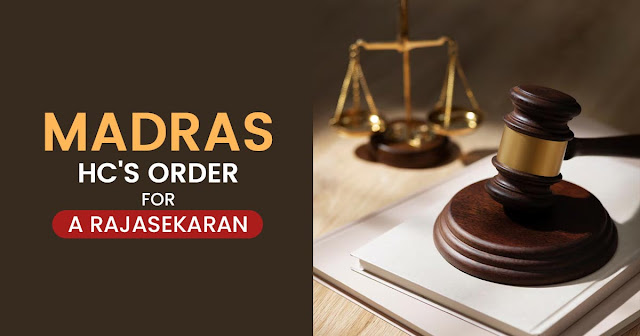The Madras High Court rejected to interrupt the removal of service of an Additional District Judge who was charged with committing in a conference call with the accused in the Sankararaman murder case.
Justice SM Subramaniam and Justice K Rajasekar stated that a Judicial Officer was desired to hold a high level of virtue. In the current case, the charges against the Judicial officer were proven. The court said that the charges were grave and touched upon the integrity and honesty of a Judicial officer. Therefore, the court held that the penalty of removal from service was not disproportionate.
"We are of the opinion that the Judicial Officers are expected to maintain a high level of integrity and in the present case, the charges Nos.1 and 4 against the writ petitioner, were held proved. The proved charges, viz., charge Nos.1 and 4 are grave in nature, touching upon the integrity and honesty of the Judicial Officer. Therefore, the punishment of removal from service, cannot be construed as disproportionate to the gravity of the proved charges. Thus, we are not inclined to interfere with the quantum of punishment," the court noted.
The claim against the District Judge, Rajasekaran, was that he was engaged in a telephonic conference call with Mr. Sankaracharya Jayendra Saraswathi of Kanchi Mutt, Mr T.Ramasamy, the then Sessions Judge, Puducherry and Ms B.Gowri Kamatchi concerning monetary payments in association with the Sanraraman murder case. Established on complaints by two advocates, the High Court had called for a vigilance inquiry, after which the charge on the Sessions Judge was fallen remarking that the voice in the recorded call did not match.
Read Also: GST DRC-01C Intimation on Mismatch B/W GSTR-3B & 2B Forms
Under suspension, Rajasekaran was placed and not allowed to retire from service on the date of his superannuation. Post-due inquiry, the decision of the Administrative Committee to charge punishment and address the Government has been approved by the Full Court of the High Court. The Government, being the appointing authority, issued the Government Order removing Rajasekaran from service. This GO was contested in the ongoing petition.
It was contended that the departmental inquiries were not true. Another allegation is that the original recording device doesn’t analyze which corrupts the charge and that needs to be acknowledged in the inquiry by the department.
The court sees that the probabilities specified the complexity of the delinquents with the crime and that itself was adequate to prove the charges in a departmental inquiry. Witnessing that the standard of proof in the inquiry of the department was distinct from that in the criminal trial, the court said that rigorous evidence is not needed to penalize the public servant. The court also witnessed that despite when the moral evil of acts of not becoming a public servant were misconducts warranting punishment under the Discipline and service rules.
"A high standard of proof is essential to convict an accused in a criminal trial. However, no such strict proof is required for punishing a public servant under the Discipline and Appeal Rules. The preponderance of probabilities is sufficient to punish an employee. Therefore examination and deposition of witnesses in the context of the Evidence Act, would not arise in departmental disciplinary proceedings. Even the moral turpitude or acting unbecoming of a public servant are misconducts warranting punishment under the Discipline and Appeal Rules," the court expressed.
The rules of natural justice were also obeyed carefully, the court sees. As per the court, the decision was chosen and the resolution was approved by the Full Court of the High Court.
Therefore, discovering no infirmity in the directions, the court was not willing to interfere with the order of punishment.


Comments
Post a Comment